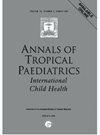Probiotics for acute diarrhoea?
引用次数: 1
Abstract
As 2015 approaches, tracking progress towards Millennium Development Goal 4 has sparked renewed interest in diarrhoea. It is estimated that there are 2.5 billion cases of diarrhoea annually in children under 5 years of age. Despite the long-established effectiveness of oral rehydration fluid (ORF), diarrhoea remains the third leading cause of under-5 mortality after neonatal death and pneumonia. Diarrhoea causes 15% of under-5 deaths globally, rising to 18% in low-income countries. Over half of diarrhoea cases and 80% of deaths occur in Africa and South Asia. Zinc supplementation during diarrhoea significantly reduces the severity and duration of the illness. Anti-diarrhoeal agents such as loperamide and codeine are contraindicated because of the risk of life-threatening ileus. Might probiotics also be a useful adjuvant therapy? A widely adopted definition of probiotic organisms is ‘live micro-organisms which, when administered in adequate amounts, confer health benefits on the host’. Organisms selected as potential probiotics are usually those isolated from the commensal gut flora of healthy individuals. They must also withstand manufacturing processes and passage through the upper gut to remain viable in the small and large intestine. Most organisms are lactic acidproducing bacteria (for example, strains of Lactobacillus) or Bifidobacterium species. However, organisms which are not normal human commensals are also included, such as the yeast Saccharomyces. The main rationale for using probiotics in diarrhoea is that they strengthen the commensal gut flora and thereby promote colonisation resistance. Here, ‘healthy’ organisms secrete a variety of anti-microbial products and compete with pathogens for available nutrients and binding sites. Probiotics may have additional anti-diarrhoeal effects by acidifying the gut contents, increasing specific and non-specific immune responses and enhancing the integrity of the gut mucosal barrier. Several systematic reviews of probiotics in children with acute diarrhoea have reported beneficial effects. Szajewska et al. reported that the proportion of children with diarrhoea lasting 3 or more days was reduced by 60% in the probiotic compared with the placebo group [95% confidence interval (CI) 43–72%; 8 trials/731 children] and probiotics reduced the duration of diarrhoea by 18.2 hours (95% CI 9.5–26.9 hrs; 8 trials/773 children). In a meta-analysis of adequately randomised and blinded trials of lactobacilli, Van Niel et al. reported that probiotics reduced the duration of diarrhoea (0.7 days, 95% CI 0.3–1.2; 7 trials/675 children) and the average number of bowel evacuations on day 2 (1.6, 95% CI 0.7–2.6 fewer evacuations; 3 trials/122 children). To better inform clinical practice, some reviews have pooled data from trials of specific probiotic organisms. Szajewska et al. analysed trials of Lactobacillus casei strain GG which achieved good follow-up. Lactobacillus GG reduced the duration of diarrhoea by 1.1 days (95% CI 0.3–1.9; 7 trials/876 infants). Chmielewska et al. reported that Lactobacillus reuteri strain ATTCC 55730 reduced the duration of diarrhoea by 22 hours (95% CI 6–38; 106 children/2 trials). In an update of a previous review, Szajewska et al. reported that Saccharomyces boulardii reduced the duration of diarrhoea by 1.08 days (95% CI 0.53–1.64; 7 trials/944 children). A striking but not unexpected feature of these reviews was marked heterogeneity in the Annals of Tropical Paediatrics (2010) 30, 283–286益生菌治疗急性腹泻?
本文章由计算机程序翻译,如有差异,请以英文原文为准。
求助全文
约1分钟内获得全文
求助全文

 求助内容:
求助内容: 应助结果提醒方式:
应助结果提醒方式:


